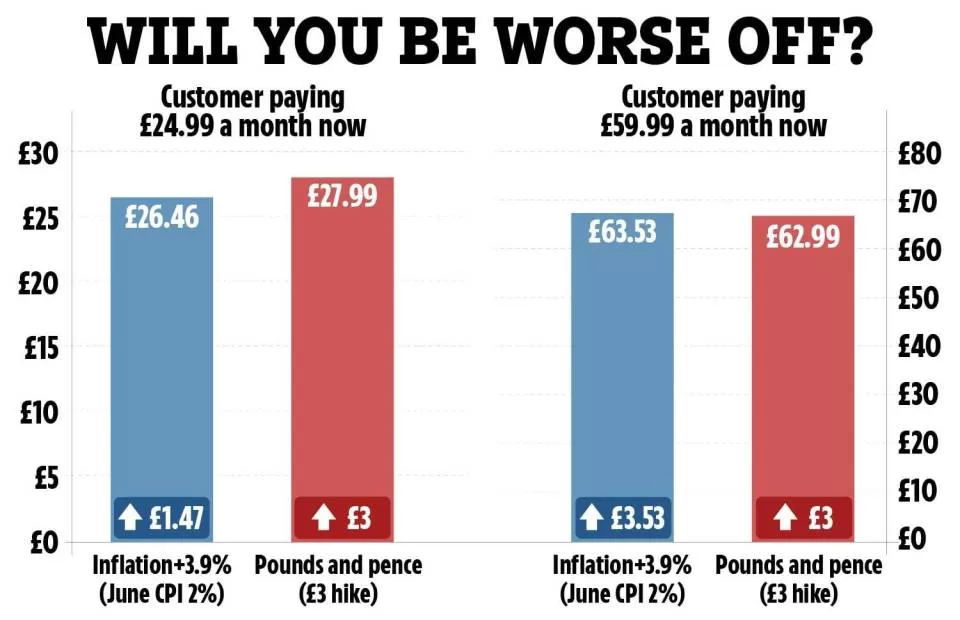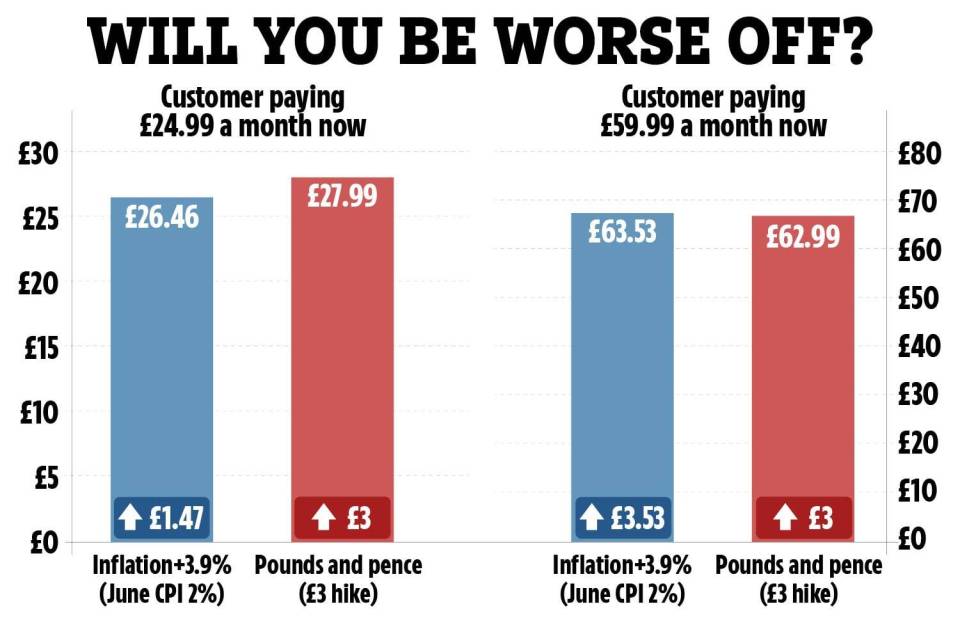MILLIONS of mobile and broadband customers on cheaper contracts will be hit by huge “unfair” bill rises, The Sun can reveal.
From January 17, telecoms firms have been ordered to display mid-contract price increases in pounds and pence by regulator Ofcom.
It means that years of inflation-linked rises impacting customers will be banned.
The rules were meant to protect customers by ensuring they knew exactly how much their contract would rise before taking it out, instead of it being linked to inflation, which can rise and fall.
However, experts have now slammed the rule change for “unfairly” impacting customers on cheaper contracts.
They argue that because inflation is now back down to 2%, customers on the cheapest mobile and broadband tariffs will likely end up paying more under the change.
Numerous large providers, including BT, EE, Plusnet, and Vodafone, have now transitioned to simpler pricing structures, abandoning increasing prices in line with the consumer prices measure of inflation (CPI) +3.9%.
Looking back at when inflation hit a 41-year high in October 2022, this would have come as a welcome relief then.
Some customers saw their bills rise by up to 17.3% last spring.
This meant a typical £25 a month mobile phone bill increased by £4.33 or £52 a year.
But the new pounds and pence rules have seen firms cap the maximum price rises at between £1 and £3 a month, depending on your service.
However, with inflation now down to 2%, Andrew Ferguson, editor of thinkbroadband.com, says that the shift from complex CPI plus percentage-based increases to straightforward pounds and pence rises may not be the boon it seems.
He argues that while inflation remains low, those on the cheapest contracts will be penalised the most by the new pounds and pence price hikes.
For example, if you pay £24.99 a month for broadband and your contract increases by £3, that is costlier than what it would be with an inflation-based rise of 5.9% (June inflation +3.9%), which would equate to approximately £1.47, according to Mr Ferguson.
But on a more expensive contract that costs £59.99 a month, a £3 rise works out better than an inflation-based rise of 5.9%, at £3.54.
This discrepancy means that those on entry-level broadband or mobile contracts, often individuals from lower-income households, could end up paying more proportionally than those on premium packages.
Martyn James, consumer rights expert, said: “One of the most depressing things about changes to regulations that are designed to make things better for us all is the speed with which businesses find ways to play the system.
“So, the introduction of a flat fee on telecommunications contracts rather than an inflation-linked increase will unfairly penalise those on tighter budgets – particularly as this rise is uncapped.”
INFLATION-LINKED PRICE HIKES
TELECOM firms have come under fire for above-inflation mid-contract price rises on fixed contracts for the past four years.
Due to clauses in contracts, providers can impose annual rises, usually in April.
The hikes are tied to either the Consumer Price Index or Retail Price Index inflation rate, which has soared during the cost-of-living crisis.
It means millions of customers faced hikes of up to 8.8% this year — adding as much as £50 to bills.
Firms argue that they need to be able to increase prices to keep up with rising costs.
But consumer experts argue that a fixed contract should live up to its name — and stay fixed.
An Ofcom spokesperson said: “Inflation might be low now, but as we’ve seen in recent years, it can be incredibly volatile, and we don’t think consumers should bear that risk.
“Our intervention means customers will have certainty and clarity upfront about the prices they will pay, so they can compare offers and select the best deal for them.”
Which firms have already changed their rules?
BT, which also owns EE and Plusnet, said in April that it would no longer raise prices mid-contract based on a percentage linked to inflation.
All BT and EE customers who took out a new contract after April 10, 2024, are affected.
From March 2025, the price of mobile contracts will rise by £1.50 a month and broadband tariffs by £3 a month.
EE TV customers will have to pay an extra £2 a month.
Out-of-bundle services will still be subject to an annual 5% increase.
The provider has said those vulnerable customers on EE Basics or BT Home Essentials contracts will be exempt from any price rises.
Plusnet will also increase its broadband price by £3 per month from the end of March next year.
Since July 2, Vodafone has been informing customers about the exact cost of their contracts in pounds and pence, including when price rises will occur.
Vodafone customers who sign a contract or upgrade this month will have their bills adjusted by a predetermined amount in April 2025 and again in April 2026.
Depending on their contract, mobile phone customers could see their prices rise by either £1 a month or £1.80 a month.
All affected broadband customers will see their bills rise by £3 a month next April.
Vodafone has said that price increases will not be applied to customers identified as financially vulnerable or those on social tariffs.
A Vodafone spokesperson said: “Ofcom’s new rules on mid-contract price rises is about giving customers the certainty and clarity they need to make the right choices for them in a market which is competitive and includes a variety of different operators with different price points.”
From August 12, 2024, customers joining or re-contracting with TalkTalk will see the monthly amount they pay for their broadband increase by £3 annually in April.
From September 2024, new and upgrading Three customers will see their annual price rise determined by pound and pence.
Broadband increases will be capped at at £2 and mobile rises between £1 and £1.50 depending on the data allowance.
CUT YOUR TELECOM COSTS NOW
SWITCHING contracts is one of the single best ways to save money on your mobile, broadband and TV bills.
But if you can’t switch mid-contract without facing a penalty, you’d be best to hold off until it’s up for renewal.
But don’t just switch contracts because the price is cheaper than what you’re currently paying.
Take a look at your minutes and texts, as well as your data usage, to find out which deal is best for you.
For example, if you’re a heavy internet user, it’s worth finding a deal that accommodates this so you don’t have to spend extra on bundles or add-ons each month.
In the weeks before your contract is up, use comparison sites to familiarise yourself with what deals are available.
It’s a known fact that new customers always get the best deals.
Sites like MoneySuperMarket and Uswitch all help you customise your search based on price, allowances and provider.
This should make it easier to decide whether to renew your contract or move to another provider.
However, if you don’t want to switch and are happy with the service you’re getting under your current provider – haggle for a better deal.
You can still make significant savings by renewing your contract rather than rolling on to the tariff you’re given after your deal.
If you need to speak to a company on the phone, be sure to catch them at the right time.
Make some time to negotiate with your provider in the morning.
This way, you have a better chance of being the first customer through on the phone, and the rep won’t have worked tirelessly through previous calls which may have affected their stress levels.
It pays to be polite when getting through to someone on the phone, as representatives are less inclined to help rude or aggressive customers.
Knowing what other offers are on the market can help you to make a case for yourself to your provider.
If your provider won’t haggle, you can always threaten to leave.
Companies don’t want to lose customers and may come up with a last-minute offer to keep you.
It’s also worth investigating social tariffs. These deals have been created for people who are receiving certain benefits.
Do you have a money problem that needs sorting? Get in touch by emailing [email protected].
Plus, you can join our Sun Money Chats and Tips Facebook group to share your tips and stories

